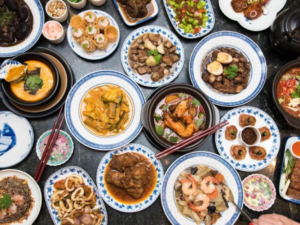Advanced Diploma in Hospitality Management
- Description
- Curriculum
- FAQ
- Announcement
- Reviews
The objective of this Advanced Diploma course in Hospitality Management is to equip students with insights into the managerial, decision-making, and supervisory dimensions of the hospitality and tourism industry.
Upon successfully concluding this course, students will have the capacity to cultivate essential knowledge and skills through incremental stages, beginning with foundational training in diverse hospitality services and advancing to encompass supervisory and managerial roles.
Upon completion of the course, you will receive a Diploma Certificate in Hospitality Management. With this cert you can find more opportunities in Singapore Market.

Modules:
WINE SERVICE & KNOWLEDGE
The curriculum encompasses a wide range of topics, enabling students to gain expertise in various aspects such as the diverse qualities of wine grapes, distinctions between Old World and New World wines, principles of wine and food pairing, methods for wine provision and service, strategies for promoting wines to customers, and insights into other blended beverages.
RESTAURANT SHOWMANSHIP
The curriculum content enables students to grasp the practices and protocols encompassing the art of service sequence within a restaurant setting. This sequence entails pre-service preparations, adept welcoming methods, order-taking proficiency, skillful suggestive selling, seamless service and clearing of diverse courses, proficient billing procedures, fostering guest feedback before departure, and adeptly addressing various customer-related scenarios.
HOUSEKEEPING OPERATIONS
The curriculum content enables students to outline the organizational structure of a hotel’s Housekeeping department, including its subsidiary divisions and their respective functions. It also covers staffing and scheduling practices, inventory management, uniform and linen oversight, laundry facility layout and operations, techniques for cleaning surfaces, utilization of housekeeping products, as well as the implementation of procedures and controls.
FINANCIAL ACCOUNTING
The curriculum content provides students with the opportunity to gain insight into the intricacies of the hotel revenue management system, the revenue cycle, fundamental auditing principles, concepts related to food and beverage cost and sales, methods for managing and controlling food cost and sales, inventory oversight, menu engineering and pricing strategies, factors influencing labor costs, and the process of budgeting.
HOSPITALITY MANAGEMENT
The curriculum content enables students to develop an awareness of the hospitality industry’s sustainability landscape and gain an overview of the operations within its various sectors, including lodging, restaurants, beverages, managed services, and other associated domains. It encompasses a study of sustainability practices and their ramifications on the hospitality sector. Additionally, the curriculum addresses the attributes and methodologies of leadership and management pertinent to the context of the hospitality industry.
HUMAN RESOURCE MANAGEMENT
The curriculum content provides students with the opportunity to elucidate the broad outline of human resource management within the hospitality industry. It encompasses an exploration of the legal landscape surrounding human resource management, the formulation of policies and procedures tailored to the hospitality sector, techniques for acquiring human resources, engagement in human resource-related activities, and addressing human resource considerations within the context of a hospitality environment.
TOURISM MANAGEMENT
The curriculum content enables students to acquire insights into a concise historical overview of tourism, the management of destinations, various categories of tourism industry participants and intermediaries, as well as the influence exerted by external factors encompassing political, social, cultural, economic, and environmental dimensions.
MARKETING FOR HOSPITALITY & TOURISM II
This module serves as an introduction to the realm of Hospitality and Tourism Marketing Industry. It offers students insights into the intricacies of Marketing Management and its strategic role in shaping plans within a service-centric culture.
INDUSTRIAL ATTACHMENT
Over a span of six months during the Industrial Attachment, students can anticipate immersion in a spectrum of operational departments within the Hospitality Industry. These include but are not limited to Food & Beverage, Front Office, Customer Service, Accommodations, Travel or Tour-related establishments, Events Management, Conventions and Conferences, Catering, Theme Parks, Entertainment, and Recreation.
To qualify for the course award, students need to successfully complete the Examination and achieve a minimum of 75% class attendance. For holders of Student Passes, maintaining a class attendance rate of 90% or higher is mandatory.
After successfully finishing the Diploma in Hospitality Management, students become eligible to seek admission with advanced standing at our affiliated universities.
All fees stated are inclusive of 8% GST.
All fees are subject to change without prior notice. Application Fee of S$302.40 is payable. This fee is non-refundable under all circumstances. Students can make payment via TT, bank draft or cheque.








